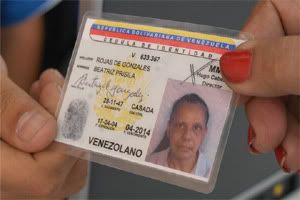"These millions of native-born Venezuelans who had spent their lives living in the shadows can now enjoy the full spectrum of rights and access to government services that Venezuelans are entitled to."
Of late immigration and the status of people who are "undocumented" has created a political firestorm in the United States between two right wing groups - the business community that wants as many immigrants as it can get for cheap labor and other conservatives who are often racist and don't want more Hispanics coming to the United States.
Yet the United States is not the only country that where immigration is an issue - it is in Venezuela too. Moreover, in Venezuela many people who are as Venezuelan as you can get and have lived there their entire lives are cut off from basic services because they don't have proper documentation - a national I.D. card or "cedula" as it is called in Spanish.
A Venezuelan ID card or "cedula"
In Venezuela everyone is expected to have a cedula and carry it with them at pretty much all times. Without it you cannot do even simple things such as carry out banking transactions. Without it you also cannot get any sort of government assistance. Worse still it is difficult to travel without it. Checkpoints abound on all major intercity roadways and one is often required to present one's cedula. Without it you are not legally entitled to pass and the only way to continue on your trip is to pay a bribe to the police officer.
As example of how difficult it is to function without it during the 02/03 oil strike some relatives in Venezuela were put in a very difficult position as several were fired from their jobs by opposition employers and just getting enough to eat was a major concern. Some relatives in the U.S. attempted to send them money to help. Unfortunately, the intended recipients, although they are 100% Venezuelan and have never been outside the country, didn't have cedulas and as a result could not pick up money from Western Union or any other financial institution. They couldn't be helped simply because they lacked a basic document that all Venezuelans are expected to have but millions have been unable to obtain. Its as if someone was born in the U.S. but had to live like an "illegal immigrant" simply because they couldn't get proper papers.
This completely absurd and unacceptable situation has gone on for decades and previous governments showed their indifference by doing nothing to remedy it. Conveniently for them they didn't have to worry about getting punished at the polls for this as people without cedulas can't vote either.
Finally, the Chavez administration came along and began a massive program, called Mission Identidad (Mission Identity), to make sure everyone living in Venezuela could get a cedula. So far between 2 and 3 million Venezuelans have benefited from this program. These millions of native-born Venezuelans who had spent their lives living in the shadows can now enjoy the full spectrum of rights and access to government services that Venezuelans are entitled to. Their days of hiding, being denied government assistance, and having to suffer abuse at the hands of petty government officials are over. It is no wonder that the vast majority of them now support the Chavez government, the first government to recognize them for what they are - Venezuelan citizens.
Further, Venezuela has had large-scale immigration from other Latin American countries, namely Colombia and the Dominican Republic. Many of those people lived in Venezuela for decades without being able to become citizens. Chavez changed that too and hundreds of thousands of them have been granted the citizenship to which they are entitled.
So successful have these programs been that they are being exported to other countries such as Bolivia:
Air Force conscript Máximo Paco beamed as he showed off the national ID card that he had long wanted but just received under a new program financed by Venezuelan President Hugo Chávez.
''I'm very thankful for the help from Venezuela,'' Paco said as he surveyed a table bedecked with a laptop, two laser printers, a webcam and a card laminator -- part of a massive ID system launched in Bolivia two months ago but modeled after one begun by Chávez in Venezuela two years ago.
The Bolivian ID card effectively recognizes Paco's citizenship, secures his right to vote and makes him eligible for an array of public services.
Imagine what it must have been like for Mr. Paco to have been "undocumented" in his own country.
They say you can tell a lot about a society by how it treats its weakest and most vulnerable members. I think that is true. You can tell a lot about the United States by just listening to the debate on immigration. You can tell a lot about previous Venezuelan governments by how they allowed millions to languish in the shadows. And you can tell a lot about Chavez by how he has brought those millions out from the shadows and allowed them to assume their rightful place as full Venezuelan citizens.